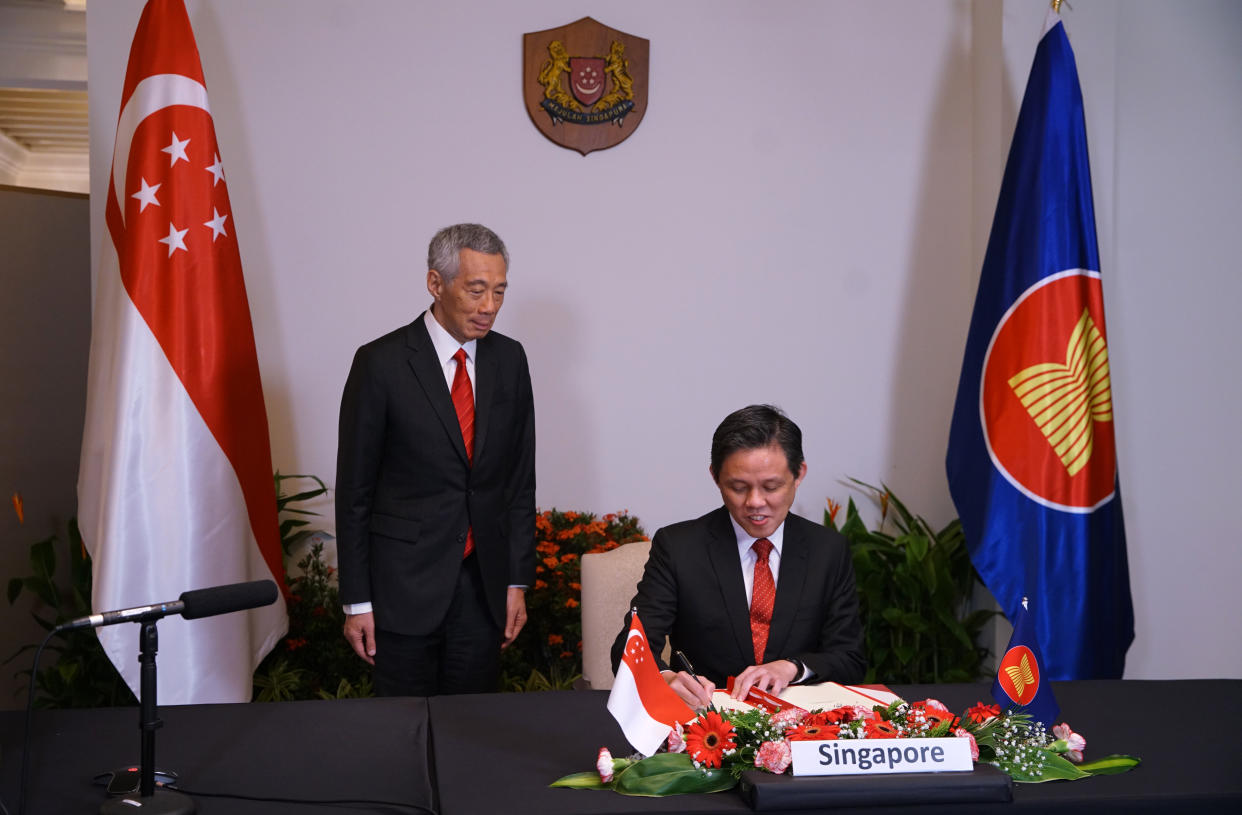Singapore among 15 countries to have signed world's largest trade deal

SINGAPORE — Singapore was among the 15 countries which signed the world’s largest trade pact on Sunday (15 November), a move widely seen as a boost for the Asia Pacific region as it battles the COVID-19 pandemic crisis.
Minister for Trade and Industry Chan Chun Sing signed the Regional Comprehensive Economic Partnership (RCEP) agreement on the sidelines of the 37th ASEAN Summit and Related Meetings, with his counterparts from the ASEAN member states – Brunei, Cambodia, Indonesia, Laos, Malaysia, Myanmar, Philippines, Thailand and Vietnam – as well as Australia, China, Japan, New Zealand and South Korea.
The signing was witnessed by Prime Minister Lee Hsien Loong and the leaders of RCEP participating countries.
The RCEP establishes a comprehensive and mutually-beneficial economic partnership that builds on existing bilateral ASEAN agreements with its five Free Trade Agreement (FTA) partners.
Comprising about 30 per cent of global Gross Domestic Product (GDP) and close to a third of the world’s population, RCEP is the world’s largest FTA to date.
Key benefits of agreement
Negotiations for the RCEP were launched in 2012 at the ASEAN Summit in Cambodia and were completed after eight years. India pulled out of the negotiations in November 2019, following concerns over trade imbalances, but several ASEAN leaders have said that the door remains open for India to join the trade deal.
Among the key benefits of the agreement include tariff elimination of at least 92 per cent of goods traded among the participating countries, with additional preferential market access for Singapore's exports, the Ministry of Trade and Industry (MTI) aid in a media release on Sunday.
The flow of goods will also be faster between countries, with simplified customs procedures and enhanced trade facilitation provisions. More companies in the services sector will be able to provide their services in participating countries as a foreign supplier, while businesses will also find it easier to navigate and integrate into the regional value chains.
Complementing Singapore’s network of FTAs
MTI added that the RCEP will complement Singapore’s existing network of FTAs, expand our economic space, and boost trade and investment flows.
It will further broaden and deepen Singapore’s economic linkages and connectivity with the region, open up opportunities and provide businesses with preferential access into growing markets.
“The RCEP is a demonstration of partner countries’ commitment to greater economic integration for the benefit of our people and businesses,” Chan said.
“Beyond its economic value, it is also a statement of our strategic intent to have a shared interest in each other’s prosperity and success. This bodes well for the security of the region.”
Countries will now work on their respective ratification processes towards the entry into force of the agreement.
Stay in the know on-the-go: Join Yahoo Singapore's Telegram channel at http://t.me/YahooSingapore
More Singapore stories:
Migrant workers receive Deepavali treats from community groups
Woodlands killings: Man gets death for murder of wife, four-year-old daughter
14-member committee on COVID-19 vaccination appointed by MOH


